中考 六大时态复习及句型转换题型专练(无答案)
中考备考 时态专项-(现在完成时)专项讲解及中考练兵

学校:________ 班级:_________ 姓名:__________语法专项动词的时态(现在完成时)初中阶段需掌握的六种基本时态有:一般现在时、一般过去时、一般将来时、现在进行时、过去进行时和现在完成时。
本节重点是掌握现在完成时。
一、现在完成时(一)结构主语+has/have+动词的过去分词(done)(二)标志词常与already,yet,just,ever,so far,before,for+一段时间,since+过去的某个时间点,in the past/last...years 等词连用。
(三)用法1.表示过去发生或已经完成的动作,对现在造成的影响或结果,常与already, yet, just, ever, so far, before 等词连用。
如:I joined the book club last month and I have read five books already.上个月我加入了读书俱乐部,并且我已经读了5本书了。
2.表示从过去开始持续到现在的动作或状态,也许还要持续下去,常和for, since连用,表示持续的动作或状态,谓语动词多为延续性动词。
如:It’s been three years since we last saw our primary school classmates.自从我们上次见到我们小学同学已经3年了。
3.延续性动词和非延续性动词的转换.现在完成时的句子中,如果有for two years...等表示一段时间的时间状语,谓语动词要用延续性动词,而不能用非延续性动词。
以下是非延续性动词(短语)与对应的延续性动词(短语)之间的转换。
注意:现在完成时与一般过去式的区别。
现在完成时和一般过去式都可以表示过去发生的动作,但现在完成时表示过去发生的动作对现在造成的影响、结果持续到现在,强调的是现在的情况;而一般过去式只表示动作发生在过去。
二、过去完成时(一)结构主语+had+动词的过去分词(done)(二)标志词常见的时间标志词包含by last week, by the end of last year等。
英语六个时态练习题初二

英语六个时态练习题初二一、时态简介在英语中,时态是用来表示动作发生的时间的,共有6个时态,分别是一般现在时、一般过去时、一般将来时、现在进行时、过去进行时和将来进行时。
下面将分别给出每个时态的定义和用法。
二、一般现在时一般现在时用来表示经常性或习惯性的动作、真理、客观事实等。
例句:1. I go to school every day.(我每天去学校。
)2. The earth revolves around the sun.(地球绕着太阳转。
)三、一般过去时一般过去时用来表示过去发生的动作或状态。
例句:1. I visited my grandparents last weekend.(我上周末去拜访了我的祖父母。
)2. She lived in Paris when she was young.(她年轻时住在巴黎。
)四、一般将来时一般将来时用来表示将来的动作或事件。
例句:1. I will meet my friends tomorrow.(我明天会和我的朋友们见面。
)2. They are going to travel around the world next year.(他们明年将会环游世界。
)五、现在进行时现在进行时用来表示正在进行的动作。
例句:1. She is studying in the library right now.(她正在图书馆学习。
)2. They are playing soccer in the park.(他们正在公园踢足球。
)六、过去进行时过去进行时用来表示过去某一时刻正在进行的动作。
例句:1. They were watching a movie at that time.(他们当时正在看电影。
)2. I was cooking dinner while she was doing her homework.(当她做作业时,我正在做晚饭。
)七、将来进行时将来进行时用来表示将来某一时刻正在进行的动作。
(完整版)中学历史句型转换专项练习
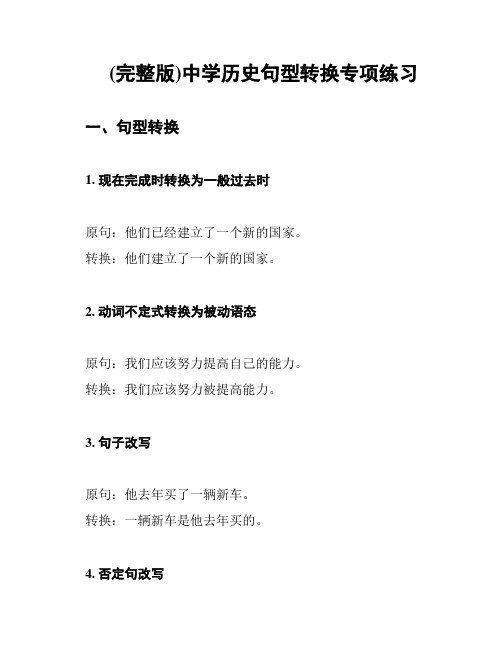
(完整版)中学历史句型转换专项练习一、句型转换1. 现在完成时转换为一般过去时原句:他们已经建立了一个新的国家。
转换:他们建立了一个新的国家。
2. 动词不定式转换为被动语态原句:我们应该努力提高自己的能力。
转换:我们应该努力被提高能力。
3. 句子改写原句:他去年买了一辆新车。
转换:一辆新车是他去年买的。
4. 否定句改写原句:我们应该珍惜时间。
转换:我们不应该浪费时间。
5. 过去进行时转换为一般过去时原句:他们正在做作业。
转换:他们做了作业。
6. 句子改写原句:明天我们将要参观博物馆。
转换:明天我们参观博物馆。
二、填空题1. 三国时期,曹操是著名的__政治家__和__军事家__。
2. 英国工业革命的标志是__蒸汽机__的发明。
3. 我国古代的纸张发明是对世界文明的一次__贡献__。
4. 中国古代最重要的思想家是__孔子__。
5. 乾隆时期是中国封建社会的__后期__。
6. 社会主义改造时期我国对工商业进行了__社会主义改造__。
三、简答题1. 请简要介绍五四运动的背景和影响。
背景:五四运动发生在1919年,是中国新民主主义革命的开端。
当时,中国人民面临着帝国主义的压迫和民族危机,感受到了国家危亡和民族独立的迫切需求。
影响:五四运动在政治、思想、文化等方面产生了深远的影响。
它激起了民族自尊心和民族自觉的觉醒,促进了中国的民主运动和革命斗争,也为中国的新文化运动提供了动力和基础。
2. 请简要介绍三国时期的历史背景和主要事件。
历史背景:三国时期发生在公元220年至280年,是中国历史上的一个重要时期。
当时,东汉王朝已经衰落,社会动荡不安,各地军阀割据,形成了魏、蜀、吴三国相互争霸的局面。
主要事件:三国时期发生了许多重要的政治斗争和战争。
其中,著名的事件有刘备与关羽、张飞联盟,官渡之战,赤壁之战等。
最终,曹操统一了北方,刘备建立了蜀汉,孙权建立了吴国,三国局面形成。
四、作文题请用你自己的话,写一篇关于中学历史研究的作文,字数不少于150字。
2024年中考英语复习六大时态专项课件

11.He ___d_o_e_s____(do) his homework every day. But he
___d_id__n_'t__d_o_(not do) it yesterday. 12. When I was young, I _p_l_a_y_e_d__(play) games with my friends.
16.The boy __is_d_r_aw__in_g__ ( draw) a picture now. 17. Listen! Some girls _ar_e_s_in_g_in_g___ (sing) in the classroom. 18. The child often __w_a_tc_h_e_s____( watch) TV in the evening. 19. We _a_r_e_(be) going to have a picnic next Tuesday.
6. There _____w__a_s____ (be)a telephone call for you just now. 7. -When ___d_id___ you ___c_o_m__e__ (come) to China?
-Last Байду номын сангаасear.
8. __W___a_s___ (be) it cold in your city yesterday? 9. How many people __w__e_re___ (be) there in your class last term? 10. There __w__a_s___ (be) a football match on TV yesterday evening,
中考 六大时态复习及句型转换题型专练(无答案)-精选文档

时态复习一、一般现在时表示现在经常发生的动作、存在的状态或习惯性的动作。
1. 肯定句结构:主语 + be(am, is, are)+其他如: I am a boy.主语+行为动词+其他如: We study English.注:主语为第三人称单数(he, she, it, 一个人名,一个物品,一个动物等)时,动词用_________________动词的变化规则:1)一般情况下,直接加-s,如:cook-cooks2)以s. x. sh. ch. 结尾,加____,如:guess-guesses, fix-fixes, watch-watches, go-goes 3)以辅音字母+y结尾,___________________________ 如:study-studies2. 否定句结构:主语+ be+ ______ +其它。
如:He is not (=isn’t)a worker.主语+ _________________________+其他。
如:I don't like bread.注:当主语为第三人称单数时,要用__________构成否定句。
3. 一般疑问句结构:_______ +主语 +其它 ?如:-Are you a student? -Yes. I am. / No, I'm not._____________ +主语+ ___________ + 其它。
如:- Does she go to work by bike? - Yes, she does. / No, she doesn't.4. 特殊疑问句结构:特殊疑问词 + be+主语+其他?如:Where is my bike?特殊疑问词+ do/does+主语+动词原形+其他?如:What do you usually have for dinner?练习:1. Daniel and Tommy _______(be) in Class One.2. Nick _______(not go) to the zoo on Sunday.3. _______ your parents _______(read) newspapers every day?4. My aunt _______(look) after her baby carefully.5. There ________(be) some water in the bottle.6. -What day _______(be) it today?-It’s Saturday二、现在进行时表示现在正在进行的动作。
九年级专项练习题时态的用法和转换练习(包括一般现在时现在进行时一般过去时过去进行时等)

九年级专项练习题时态的用法和转换练习(包括一般现在时现在进行时一般过去时过去进行时等)九年级专项练习题时态的用法和转换练习(包括一般现在时、现在进行时、一般过去时、过去进行时等)时态是英语语法中的一个重要部分,它用于表示动作或状态发生的时间。
在九年级英语专项练习中,时态的正确使用是非常关键的。
本文将针对一般现在时、现在进行时、一般过去时和过去进行时等时态进行讲解,并提供相应的练习题目。
一、一般现在时一般现在时表示经常性、习惯性的动作或存在的事实,也可用于表示客观真理。
它的结构是:主语+ 动词原形(第三人称单数加-s/-es)。
练习题:1. My father ______ (go) to work by bus every day.2. They _______ (study) English at school.3. She _______ (like) to play basketball.答案:1. goes2. study二、现在进行时现在进行时表示现阶段正在进行的动作。
它的结构是:主语 + be动词(am/is/are)+ 动词-ing。
练习题:1. Look! The children ______________ (play) in the garden.2. I ______________ (read) a book at the moment.3. They ______________ (watch) a movie now.答案:1. are playing2. am reading3. are watching三、一般过去时一般过去时表示过去发生的动作或存在的状态。
它的结构是:主语+ 动词过去式。
练习题:1. We _______ (go) to the beach last week.2. She _______ (visit) her grandparents yesterday.3. He _______ (play) football with his friends last night.1. went2. visited3. played四、过去进行时过去进行时表示过去某个时间点正在进行的动作。
英语时态归纳及句型转换练习题答案大全
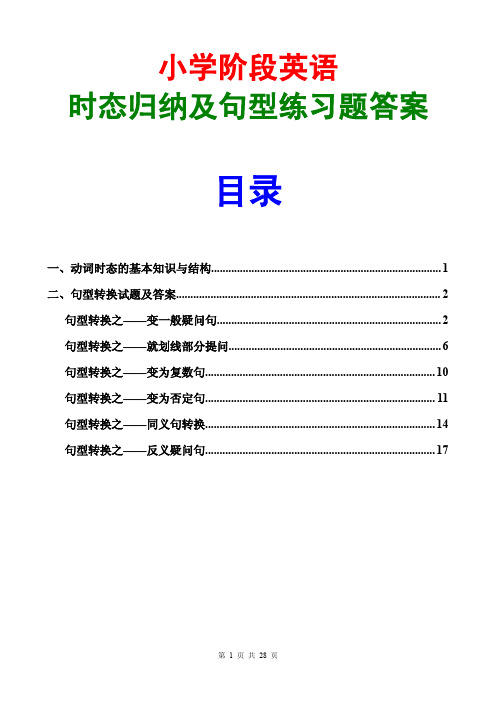
ago,yesterday,
主语+was/were+not +.......
the day before
主语+didn’t+动词原形+.......
yesterday,last
Was/Were +主语+......?
中考时态练习题
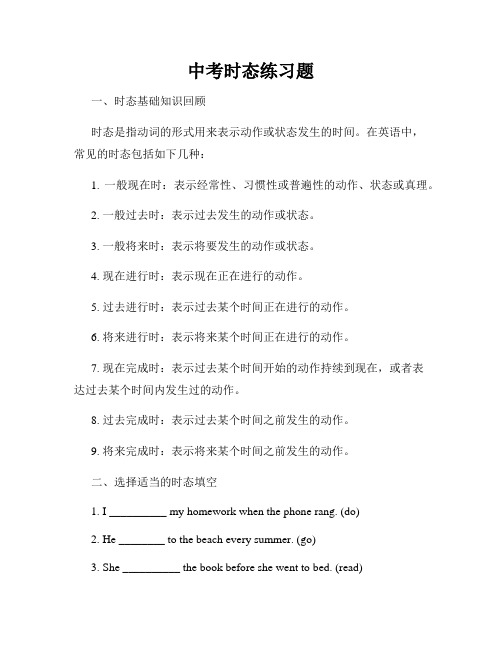
中考时态练习题一、时态基础知识回顾时态是指动词的形式用来表示动作或状态发生的时间。
在英语中,常见的时态包括如下几种:1. 一般现在时:表示经常性、习惯性或普遍性的动作、状态或真理。
2. 一般过去时:表示过去发生的动作或状态。
3. 一般将来时:表示将要发生的动作或状态。
4. 现在进行时:表示现在正在进行的动作。
5. 过去进行时:表示过去某个时间正在进行的动作。
6. 将来进行时:表示将来某个时间正在进行的动作。
7. 现在完成时:表示过去某个时间开始的动作持续到现在,或者表达过去某个时间内发生过的动作。
8. 过去完成时:表示过去某个时间之前发生的动作。
9. 将来完成时:表示将来某个时间之前发生的动作。
二、选择适当的时态填空1. I __________ my homework when the phone rang. (do)2. He ________ to the beach every summer. (go)3. She __________ the book before she went to bed. (read)4. They ___________ to Europe next week. (fly)5. We ___________ dinner when you arrived. (have)6. I _________ my bike to school every day. (ride)7. The movie ____________ before we got there. (start)8. He ___________ for that company since 2010. (work)9. By the time she got home, her parents __________ already. (leave)10. We _____________ English for five years. (study)三、一般现在时或一般过去时将下面的句子改写为一般过去时或一般现在时。
初中英语语法专项复习英语动词时态和语态讲解和练习题
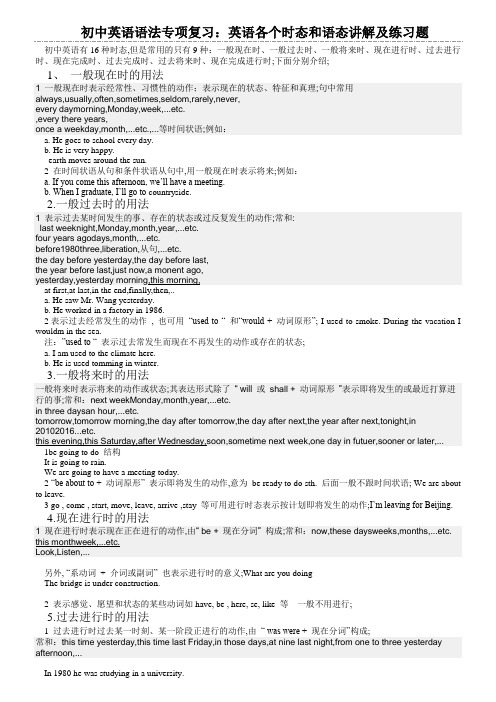
初中英语语法专项复习:英语各个时态和语态讲解及练习题初中英语有16种时态,但是常用的只有9种:一般现在时、一般过去时、一般将来时、现在进行时、过去进行时、现在完成时、过去完成时、过去将来时、现在完成进行时;下面分别介绍;1、一般现在时的用法1 一般现在时表示经常性、习惯性的动作;表示现在的状态、特征和真理;句中常用always,usually,often,sometimes,seldom,rarely,never,every daymorning,Monday,week,...etc.,every there years,once a weekday,month,...etc.,...等时间状语;例如:a. He goes to school every day.b. He is very happy.earth moves around the sun.2 在时间状语从句和条件状语从句中,用一般现在时表示将来;例如:a. If you come this afternoon, we’ll have a meeting.b. When I graduate, I’ll go to countryside.2.一般过去时的用法1 表示过去某时间发生的事、存在的状态或过反复发生的动作;常和:last weeknight,Monday,month,year,...etc.four years agodays,month,...etc.before1980three,liberation,从句,...etc.the day before yesterday,the day before last,the year before last,just now,a monent ago,yesterday,yesterday morning,this morning,at first,at last,in the end,finally,then,..a. He saw Mr. Wang yesterday.b. He worked in a factory in 1986.2表示过去经常发生的动作, 也可用“used to “ 和“would + 动词原形”; I used to smoke. During the vacation I wouldm in the sea.注:”used to “ 表示过去常发生而现在不再发生的动作或存在的状态;a. I am used to the climate here.b. He is used tomming in winter.3.一般将来时的用法一般将来时表示将来的动作或状态;其表达形式除了“ will 或shall + 动词原形”表示即将发生的或最近打算进行的事;常和:next weekMonday,month,year,...etc.in three daysan hour,...etc.tomorrow,tomorrow morning,the day after tomorrow,the day after next,the year after next,tonight,in 20102016...etc.this evening,this Saturday,after Wednesday,soon,sometime next week,one day in futuer,sooner or later,...1be going to do 结构It is going to rain.We are going to have a meeting today.2 “be about to + 动词原形” 表示即将发生的动作,意为be ready to do sth. 后面一般不跟时间状语; We are about to leave.3 go , come , start, move, leave, arrive ,stay 等可用进行时态表示按计划即将发生的动作;I’m leaving for Beijing.4.现在进行时的用法1 现在进行时表示现在正在进行的动作,由“ be + 现在分词” 构成;常和:now,these daysweeks,months,...etc. this monthweek,...etc.Look,Listen,...另外, “系动词+ 介词或副词” 也表示进行时的意义;What are you doingThe bridge is under construction.2 表示感觉、愿望和状态的某些动词如have, be , here, se, like 等一般不用进行;5.过去进行时的用法1 过去进行时过去某一时刻、某一阶段正进行的动作,由“ was were + 现在分词”构成;常和:this time yesterday,this time last Friday,in those days,at nine last night,from one to three yesterday afternoon,...In 1980 he was studying in a university.He was reading a novel when I came in.6.现在完成时的用法现在完成时由“have/has + 过去分词.其使用有两种情况:1 现在完成时所表示的动作在说话之前已完成,但对现在有影响;句中没有具体时间状语;常和:just,alreadly,yet,never,ever,now,before,this week,today,these days,once,twice,three times,...He has gone to Fuzhou.He has been to Fuzhou.2 现在完成时所表示的动作开始于过去,持续到现在,也许还会持续下去常用for 和since表示一段时间的状语或since then1949,last Monday,two o'clock,从句...,etc.,ever since then,for three daysa long time,two hours,...etc.so far , now, today, this wek month, year 等表示包括现在内的状语;He has studied English for 5 years.He has studied English since 1985.Now I have finished the work..注意:表示短暂时间动作的词如come, go , die, marry, buy 等的完成时不能与for, since 等表示一般时间的词连用;正确:I have bought the book already.错误:I have bought the book for two years.改:I have had the bookl for two years.7.过去完成时的用法1 过去完成时由“had + 过去分词”构成;过去完成时的动作表示过去某一时刻或某一时刻或某一动作之前完成的动作或状态;句中常用by then1977,yesterday,eight last night,the time we got there,...etc.by the end of last termweek,year,month,...etc..by, before, until, when 等词引导的时间状语;By the end of last year we had built five new houses.I had learnt 5000 words before I entered the university.2过去完成时的动词还可表示过去某一时刻之前发生的动作或状态持续到过去某个时间或持续下去;Before he slept, he had worked for 12 hours.8.过去将来时的用法过去将来时表示从过去的某个时间看来将要发生的动作或存在的状态;过去将来时由“should 或would + 动词原形” 构成;第一人称用should, 其他人称用would. ;常和:They were sure that they would succeed.二动词语态1.当句子的主语是动作的执行者时, 谓语的形式叫主动语态;句子的主语是动作承受者时,谓语的形式叫被动作语态;被动语态由助动词be + 过去分词构成,时态通过be 表现出来;1 一般现在时:You are required to do this.2 一般过去时:The story was told by her.3 一般将来时:The problem will be discussed tomorrow.4 现在进行时:The road is being widened.5 过去进行时:The new tool was being made.6 现在完成时:The novel has been read.7 过去完成时:He said that the work had been finished.8 过去将来时:He said that the trees would be planted soon.2. 一些特殊的被动结构1 带情态动词的被动结构:The problem must be solved soon.2 带不定式的被动结构:The room is going to be painted.The homework needs to be done with care.3 短语动词的被动:a.不及物动词+介词:若这类短语动词是及物性的,则可用于被动语态中,如:laugh at, look after, talk about, think of 等;若这类短语动词是不及物性的则不可用于被动语态中,如:book up, look down. 等b.及物动词+副词:bring about, carry out, find out, make out, put away, put off, take up, turn down, turn out, wipe out 等c. 动词+副词+介词:do away with, face up to, give into ,look down upon, make up with等d. 动词+名词+介词:catch sight of, keep on eye on, make a fool of , pay attention to , put an end to , set fire/light to , take notice of 等4 带复合宾语的动词在改为被动语态时,一般把主动结构中的宾语改为主语,宾语补足语保留在谓语后面;We always keep the classroom clean.比较:The classroom is always kept clean.5主动形式表示被动意义的词;常见的有:a.主动形式,这时动名词同句中的主语有动宾关系;The children need looking after.The windows wants /requires repairing.This point deserves mentioning.练习题1. It is a fine day. The sun __________shine brightly.2. They ___________visit the Science Museum next Sunday.3. Mr Brown________live in Beijing since he came to China.4. Mr Wang ________teach us English two years ago.5. The Smiths _______________ watch TV at this time last night.6. We __________learn about ten English songs by the end of last term.7. Father said that he ____________buy a new bike for me the next Friday.8. Bill isn¡¯t here. He ___________chat with his friends in the classroom.9. The teacher said that the moon __________go round the earth.10. The Young Pioneers will go to the zoo if it ____________not rain this Sunday.11. Listen They __________talk about the new film.12. Jim asked us what ___________happen in China in 1976.13. My mobile phone ___________steal on a bus last week.14. The host ____________interview the little boy just now.15. The Greens __________watch TV now.16. He said that he _____________ring me up when he got there.17. We ____________learn English for about three years.18. My brother_____________join the League in 1997.19. The farmers __________pick apples when I saw them.20. The red skirt __________cost the girl forty yuan.21. The film ____________begin when I got to the cinema.22. The girl told me that she wanted to be an English teacher when she _____grow up.23. My sister is a student and she _____________study at a middle school nearby.24. Mr Green __________travel to several places in South China since he came here.25. You _________catch the early bus if you get up early.26. _______you been________wear glasses all the time27. I’ll go home as soon as I _______finish my homework.29. Most science books are ______write in English.30. I ____________stay there for two months last year.31. Tell Lily to call me as soon as she _______.A. will arriveB. gets thereC. has goneD. reach here32. ----Hi, Kate. You look tired. What’s the matter ----I ______ well last night.A. didn’t sleepB. don’t sleepC. haven’t sleptD. won’t sleep33. ----Excuse me, look at the sign over there, please. Could you stop smoking----Sorry, I ____ that.A. didn’t seeB. don’t seeC. won’t seeD. can’t see34. ----Well, I found this. I think it must be yours. ----My watch Thank you. Where _____itA. do you findB. had you foundC. were you findingD. did you find35. ----Don you know when Dr White ____ for dinner this evening----No, but I think he ____ when he is free.A. will come; comesB. will come; will comeC. comes; comesD. comes; will come36. Look at those black clouds. It _____ rain. Let’s hurry. A. maybe B. would C. has D. is going to37. ----Jimmy is leaving for a holiday. ----Really Where ____ he ____A. has; goneB. will; goC. did; goD. does; go38. ----Shall we go shopping now ---Sorry, I can't. I ____ my shirts.A. washB. washesC. washedD. am washing39. ----I called you yesterday evening, but there was no answer.----Oh, I am sorry. I ___ dinner at my friend's home.A. haveB. hadC. was havingD. have had40. The Oriental Pearl TV Tower ____ thousands of visitors since 1995.A. attractedB. attractsC. has attractedD. will attract46. ----Why didn't you go to the cinema yesterday -----Because I ____ the film before.A. had seenB. have seenC. have watchedD. has watched47. I don't think John saw me. He ____ a book at that moment.A. just readB. has just readC. was just readingD. had just read48. Mr Smith ____ a book about China last year but I don't know whether he has finished it.A. has writtenB. wroteC. had writtenD. was writing49. Mr White ____ the newspaper while his daughter ____TV.A. has read; was watchingB. was reading; watchedC. was reading; was watchingD. reading; watched50. ---- I ____ you at the meeting. Why ----I was ill. A. saw B. have seen C. not see D. didn't see51. The 29th Olympic Games ____ in Beijing in 2008. A. hold B. will hold C. will be held D. held52. Hurry up The play ____ for ten minutes. A. has been on B. has begun C. had begun D. began53. ----May I speak to Mr Smith ----Sorry, he ____ Australia. But he ____ in two days.A. has been to; will come backB. has gone to; will be backC. has been in; would come backD. is leaving for; doesn't come back54. I can't go to the theater tonight because I ____ my ticket.A. have lostB. had lostC. will loseD. was losing55. ----What a nice bike How long ____ you ____ it ----Just two weeks.A. have; boughtB. did; buyC. have; hadD. are; having56. ----I'm sorry to have kept you waiting. ----Oh, not at all. I ____ here only for a few minutes.A. have comeB. had beenC. wasD. have been57. ----____ my dictionary anywhere ---- Yes. I saw it on your desk a moment ago.A. Did you seeB. If you seeC. Had you seenD. Would you see58. We were all surprised when he mad it clear that he ____ office soon.A. leavesB. would leaveC. will leaveD. had left答案:I. 1. shines/ is shining 2. are going to/ will visit 3. has lived 4. taught5. were watching6. had learned7. would buy8. is chatting9. goes 10.doesn't rain 11. are talking 12. happened 13. was stolen 14. interviewed15. are watching16. would ring 17. have learned 18. joined 19. were picking 20. cost21. had begun 22. grew 23. studies 24. has traveled 25. will catch26. Have; wearing 27. finish 28. haven't heard 29. written 30. stayedII. 31--35 BAADB 36--40 DBDCC 41--45 ACBAC 46--50 ACDCD51--55 CABAC 56--60 DABDA 61--65 BDBAB 66-70 BDABC 71--75 BCADD。
(完整)初中英语六大时态练习及答案

(完整)初中英语六大时态练习及答案六大时态专项训练一、用所给词的适当形式填空:1.He______ swimming in the river every day in summer. (go)2.It________you are right. ( seem )3. Look, the children______ basketball on the playground. ( play )4. He ______to the radio when I came in. ( listen )5.It is very cold. I think it______ . ( rain )6. I need some paper . I ______ some for you. ( bring )7.I cant find my pen . Who______ it ? ( take )8.He said that he______ back in five minutes . ( come )meet him. He______ when I got there. ( leave )9.I didn’t10.I______my bike, so I have to walk to school. ( lose )11.He______down and began to read his newspaper. ( sit )12.He is very hungry. He_________ anything for three days. ( not eat )13.I______with you if I have time . ( go )14.We will go to the cinema if it______fine . (be )15.I will tell her the news when she______to see me next week. (come)16.When______you______the car ? In 1998 . ( buy )17.We______good friends since we met at school . (be)18.What______you______ at five yesterday afternoon ? (do)19.The bike is nice . How much ______it______? (cost)二、选择最佳答案填空()1.We’ll go swimming if the weather ______fine tomorrow.A. isB. wasC. will beD. is going to be()2.It______five years since he has left for Beijing.A. wasB. has beenC. isD. is going to beleave the office until your friend ______back.()3.Please don’tA. cameB. comesC. have comeD. will come()4.By the end of last year he ______about 1500 English words.A. learnsB. learnedC. was learningD. had learned()5.Listen ! Someone ______in the next room .A. criedB. cryingC. is cryingD. has cried()6.You must tell him the news as soon as you ______him.A. seeB. seesC. will seeD. is seeing()7.He told me that he ______to see us the next day.A. comesB. cameC. will comeD. would come()8.We can’t find him anywhere . Perhaps he ______home.A. is goingB. wentC. has comeD. would come()9.The teacher told us that the sun ______bigger than the earth.A. isB. wasC. has beenD. will be()10.Could you tell me where the railway station______?A. wasB. isC. will beD. would be()11.We______to the Great Wall several times.A. goB. were goingC. have goneD. have been()12.It seemed that the old man ______for something over there.A. looksB. lookedC. was lookingD. has looked()13.He was sure that he ______his wallet in the office .A. leftB. would leaveC. had leftD. has left()14.You must study hard if you______ want to fail the exam.A. won’tB.don’tC. haven’tD. hadn’t()15. I’mafraid you cant sit here . --- Sorry, I ______know.A. don’tB. won’tC. can’tD. didn’t()16. As she ______the newspaper, Granny ______asleep.A. read , was fallingB. was reading; fellC. was reading , was fallingD. read , fell ()17. Jim is not coming tonight . But he______ !A. promisesB. promisedC. will promiseD. had promised()18. What’sher name? I______.A. forgetB. forgotC. had forgottenD. am forgetting三、动词时态能力综合测试()1.He often ______his clothes on Sundays.A. washingB. washesC. has washedD. wash()2.I’m Chinese. Where ______from?A. do you comeB. you are comingC. you comeD. are you coming()3.May______to school.A. never walksB. is never walkingC. walk neverD. never is walking()4.We will start as soon as our teacher______ .A. comesB. will comeC. comeD. is coming()5.How long ago ______playing football?A. have you stoppedB. had you stoppedC. did you stopD. do you stop ()6.It______ hard when I left my house .A. is rainingB. rainsD. will rain()7.I think this question ______to answer.A. easyB. is easyC. was easyD. will easy()8. Don’ttalk so loudly . Your father ______.A. sleepsB. is sleepingC. sleptD. had slept()9.How many people does the doctor know who ______of the disease ?A. are dyingB. is dyingC. has diedD. dies()10.I______my homework now.A. finishB. finishedC. have finishedD. had finished()11.He______for three years.A. has joinedB. has been in the armyC. joinedD. has served the army()12.His grandfather ______for thirty years.A. diedC. has been deadD. has died()13.I______ from my brother for a long time.A. not have heardB. have not heardC. have heard notD. do not hear()14.Maths, one of the most important subjects, ______always interested him.A. hasB. haveC. areD. is()15.Did your brother go to America last year? ______.A. No , he did never go thereB. No , he has never gone hereC. No , he never was thereD. No , he has never been there()16.He______ that factory since 1958.A. has leftB. has worked inC. has gone fromD. has come to()17.Our teacher ______to Beijing three times.A. wentB. had goneC. has goneD. has been()/doc/4a6340816.html,st weekJohn______his leg.A. felt and brokenB. fell and brokeC. feels and breaksD. fallen and broken ()19.Jack______his thick coat because it was snowing.A. puts onB. put onC. takes onD. took on()20.He______the picture on the wall.A. hangedB. hungC. has hangedD. was hanged()21.Next month______twenty five.A. has my sisterB. my sister will beC. my sister shall haveD. my sister is going to be ()22.You______her again in a few weeks.A. will seeB. have seenC. had seenD. have been seen()23. By the end of last term we______English for two years.A. have studiedB. have been studiedC. would studiedD. had studied()24.Mrs Brown______in New York for three years before she went to London.A. livedB. had livedC. has livedD. will live()25.When we arrived , the dinner______.A. already beganB. has already begunC. had already begunD. was just begun ()26.I will go home for the holiday as soon as I______ my exams.A. will finishB. finishC. finishingD. finished()27.When______, Ill talk to him.A. does Peter comeB. Peter will comeC. Peter comesD. can Peter come ()28.My sister______to see me . Shell be here soon.A. comesB. is comingC. had comeD. came()29.They said they______our answer the next day .A. had heardB. would hear ofC. would hearD. will hear()30.The old man said that light______faster than sound.A. wentB. will goC. travelsD. will travel二ABBDC ADBAB DCCBD CBB三.BAAAC CBBAC BCBDD BD。
2023中考英语六大时态语法总结与真题练习
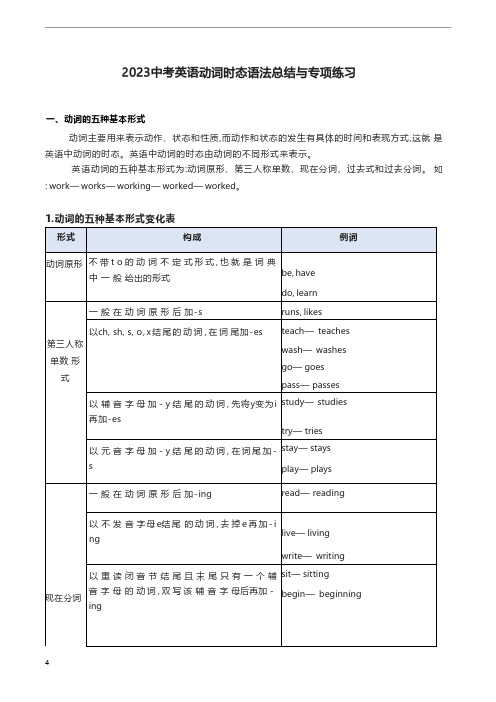
一、动词的五种基本形式动词主要用来表示动作、状态和性质,而动作和状态的发生有具体的时间和表现方式,这就是英语中动词的时态。
英语中动词的时态由动词的不同形式来表示。
英语动词的五种基本形式为:动词原形、第三人称单数、现在分词、过去式和过去分词。
如:work—works—working—worked—worked。
1.动词的五种基本形式变化表2.时态的基本框架常见六种时态的构成及用法用法:①现在经常性的状态或动作;②客观事实和真理。
构成:①be+表语;②实义动词作谓语标志词:often,sometimes,usually,always,never,twice a month,every day/week/month/year(every系列)例句:He usually gets to school early.他通常很早到校。
The moon moves around the earth.月亮绕着地球转。
1.认识从实践开始Knowledge practice.2.如果明天下雨,我们就不去公园了。
If it tomorrow,we to the park.【答案】 1.begins with.2.rains,won’t go用法:表示过去的动作或状态。
构成:①was/were+表语;②实义动词作谓语标志词:a moment ago,just now,ago,yesterday,last night/week/month(last系列)例句:We went to Yunnan last Monday.上周一我们去了云南。
1.She(not visit)her aunt last weekend.2.My friend,Lucy,(study)for the math test and(practice)English last night.【答案】 1.didn’t visit 2.studied practiced用法:表示将来的动作或状态。
中考英语语法动词的时态专项复习与练习题(含答案)

中考英语语法动词的时态专项复习与练习题(含答案)初中阶段需掌握的六种基本时态有:一般现在时、一般过去时、一般将来时、现在进行时、过去进行时和现在完成时。
本节重点是一般现在时、一般过去时和一般将来时。
一、一般现在时(一)结构1.主语+be动词(am/is/are)+其他;2.主语+实义动词原形/第三人称单数形式+其他;(二)标志词常见的时间标志词包含often,sometimes,usually,always,on Sundays,every day/week/month/year 等。
(三)用法1.表示经常性或习惯性的动作或状态。
如:I drink milk every day. 我每天都喝牛奶。
2.表示普遍真理、客观存在或科学事实。
如:The moon moves around the earth.月球绕着地球转。
3.“主将从现”原则。
主句是一般将来时,从句是由when,after,before,not...until,as soon as 等引导的时间状语从句或由if,unless,as long as,once引导的条件状语从句时,谓语动词应用一般现在时。
如:I will tell you as soon as I know the result.我一知道结果就告诉你。
二、一般过去时(一)结构1.主语+be动词(was/were)+其他;2.主语+实义动词过去式+其他;(二)标志词常见的时间标志词包含yesterday,just now,two days ago,last night/week/month/year,the other day 等。
(三)用法1.表示过去某个时间发生的动作或存在的状态。
如:Last year I went to the Hangzhou National Tea Museum. 去年我去了杭州国家茶叶博物馆。
2.表示在过去一段时间内,经常性或习惯性的动作。
常与always,usually,often,sometimes,never 等频度副词连用。
人教版中考英语时态练习试题(一般现在时、现在进行时、一般将来时、一般过去时专项练习) 无答案
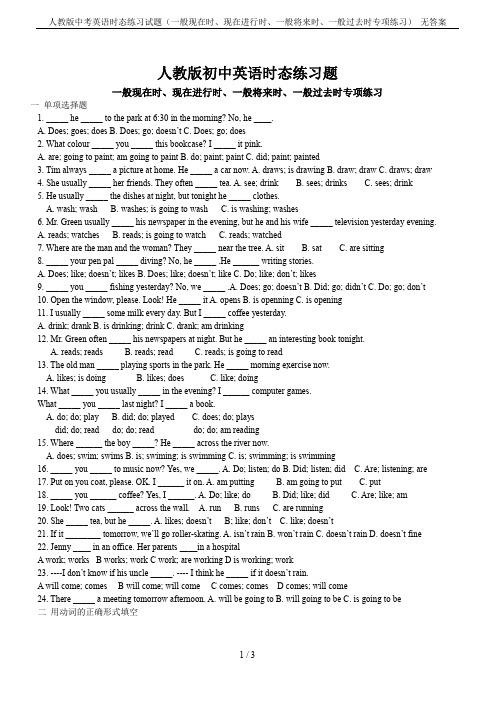
人教版初中英语时态练习题一般现在时、现在进行时、一般将来时、一般过去时专项练习一单项选择题1. _____ he _____ to the park at 6:30 in the morning? No, he ____.A. Does; goes; doesB. Does; go; doesn’tC. Does; go; does2. What colour _____ you _____ this bookcase? I _____ it pink.A. are; going to paint; am going to paintB. do; paint; paintC. did; paint; painted3. Tim always _____ a picture at home. He _____ a car now. A. draws; is drawing B. draw; draw C. draws; draw4. She usually _____ her friends. They often _____ tea. A. see; drink B. sees; drinks C. sees; drink5. He usually _____ the dishes at night, but tonight he _____ clothes.A. wash; washB. washes; is going to washC. is washing; washes6. Mr. Green usually _____ his newspaper in the evening, but he and his wife _____ television yesterday evening.A. reads; watchesB. reads; is going to watchC. reads; watched7. Where are the man and the woman? They _____ near the tree. A. sit B. sat C. are sitting8. _____ your pen pal _____ diving? No, he _____ .He ______ writing stories.A. Does; like; doesn’t; likesB. Does; like; doesn’t; likeC. Do; like; don’t; likes9. _____ you _____ fishing yesterday? No, we _____ .A. Does; go; doesn’t B. Did; go; didn’t C. Do; go; don’t10. Open the window, please. Look! He _____ it A. opens B. is openning C. is opening11. I usually _____ some milk every day. But I _____ coffee yesterday.A. drink; drankB. is drinking; drinkC. drank; am drinking12. Mr. Green often _____ his newspapers at night. But he _____ an interesting book tonight.A. reads; readsB. reads; readC. reads; is going to read13. The old man _____ playing sports in the park. He _____ morning exercise now.A. likes; is doingB. likes; doesC. like; doing14. What _____ you usually _____ in the evening? I ______ computer games.What _____ you _____ last night? I _____ a book.A. do; do; playB. did; do; playedC. does; do; playsdid; do; read do; do; read do; do; am reading15. Where ______ the boy _____? He _____ across the river now.A. does; swim; swimsB. is; swiming; is swimmingC. is; swimming; is swimming16. _____ you _____ to music now? Yes, we _____. A. Do; listen; do B. Did; listen; did C. Are; listening; are17. Put on you coat, please. OK. I ______ it on. A. am putting B. am going to put C. put18. _____ you ______ coffee? Yes, I ______. A. Do; like; do B. Did; like; did C. Are; like; am19. Look! Two cats ______ across the wall. A. run B. runs C. are running20. She _____ tea, but he _____. A. likes; doesn’t B; like; don’t C. like; doesn’t21. If it ________ tomorrow, we’ll go roller-skating. A. isn’t rain B. won’t rain C. doesn’t rain D. doesn’t fine22. Jenny ____ in an office. Her parents ____in a hospitalA work; worksB works; workC work; are workingD is working; work23. ----I don’t know if his uncle _____. ---- I think he _____ if it doesn’t rain.A will come; comesB will come; will comeC comes; comesD comes; will come24. There _____ a meeting tomorrow afternoon. A. will be going to B. will going to be C. is going to be二用动词的正确形式填空三、按要求变换句型。
(完整)初中物理时态专项训练

(完整)初中物理时态专项训练初中物理时态专项训练
1. 现在时态:
- 当我们描述科学事实或普遍真理时,我们使用现在时态。
例如:太阳在中心发出热量。
- 当我们谈论定期事件或经常发生的事情时,我们使用现在时态。
例如:我每天都去学校上课。
- 当我们谈论现在正在发生的事情时,我们使用现在时态。
例如:我正在读这本书。
2. 过去时态:
- 当我们谈论过去的事情或经历时,我们使用过去时态。
例如:昨天我参观了博物馆。
- 当我们谈论以前的惯或常态时,我们使用过去时态。
例如:
我小时候常在公园玩耍。
3. 将来时态:
- 当我们谈论将来将要发生的事情时,我们使用将来时态。
例如:我明天将要去看电影。
- 当我们做出计划或打算时,我们使用将来时态。
例如:我打算下个月研究物理。
以上是初中物理时态的基本用法和示例,请根据具体的语境和要求练相应的时态,加强对物理时态的理解和应用。
> 注意:本文档提供了初中物理时态的基本知识和示例,但具体练习题目需要根据教材和课堂指导确定。
- 1、下载文档前请自行甄别文档内容的完整性,平台不提供额外的编辑、内容补充、找答案等附加服务。
- 2、"仅部分预览"的文档,不可在线预览部分如存在完整性等问题,可反馈申请退款(可完整预览的文档不适用该条件!)。
- 3、如文档侵犯您的权益,请联系客服反馈,我们会尽快为您处理(人工客服工作时间:9:00-18:30)。
时态复习一、一般现在时表示现在经常发生的动作、存在的状态或习惯性的动作。
1. 肯定句结构:主语 + be(am, is, are)+其他如: I am a boy.主语+行为动词+其他如: We study English.注:主语为第三人称单数(he, she, it, 一个人名,一个物品,一个动物等)时,动词用_________________动词的变化规则:1)一般情况下,直接加-s,如:cook-cooks2)以s. x. sh. ch. 结尾,加____,如:guess-guesses, fix-fixes, watch-watches, go-goes 3)以辅音字母+y结尾,___________________________ 如:study-studies2. 否定句结构:主语+ be+ ______ +其它。
如:He is not (=isn’t)a worker.主语+ _________________________+其他。
如:I don't like bread.注:当主语为第三人称单数时,要用__________构成否定句。
3. 一般疑问句结构:_______ +主语 +其它 ?如:-Are you a student? -Yes. I am. / No, I'm not._____________ +主语+ ___________ + 其它。
如:- Does she go to work by bike? - Yes, she does. / No, she doesn't.4. 特殊疑问句结构:特殊疑问词 + be+主语+其他?如:Where is my bike?特殊疑问词+ do/does+主语+动词原形+其他?如:What do you usually have for dinner?练习:1. Daniel and Tommy _______(be) in Class One.2. Nick _______(not go) to the zoo on Sunday.3. _______ your parents _______(read) newspapers every day?4. My aunt _______(look) after her baby carefully.5. There ________(be) some water in the bottle.6. -What day _______(be) it today?-It’s Saturday二、现在进行时表示现在正在进行的动作。
句中一般有这些词:Look, Listen, now1. 肯定句结构:主语+ am, is, are + 动词现在分词动词现在分词的变化规则1)一般情况下,直接加ing,如:cook-cooking2)以不发音的e结尾,______________,如:make-making, taste-tasting3)末尾是一个元音字母和一个辅音字母,_______________________________,如:run-running, stop-stopping1.否定句结构:主语+am ,is , are + ______ +动词现在分词+其他(注: is not=isn’t, are not=aren’t)2.一般疑问句结构: Am, Is, Are+主语+动词现在分词+其他?如:Are you listening to music?3.特殊疑问句结构:特殊疑问词+一般疑问句?如:What is he doing?练习:1.The boy __________________ ( draw)a picture now.2. Listen. Some girls _______________ ( sing)in the classroom .3. My mother _________________ ( cook )some nice food now.4. What _____ you ______ ( do ) now?三、一般将来时表示将要发生的动作或存在的状态及打算、计划或预备做某事。
句中一般有以下时间状语:tomorrow, next day(week, month, year…),soon, the day after tomorrow等。
1、陈述句结构:①主语+be going to _____;②主语+will ______.2、否定句结构:在be动词后加________或will后加not成__________。
如:I’m not going to have a picnic this afternoon.3、一般疑问句结构:______+ 主语+going to do; _______+ 主语+ do?如:Are you going to do homework?4、特殊疑问句:特殊疑问词+一般疑问句如:What are you going to do tomorrow? What will you do tomorrow?5、同义句:be going to = willI am going to go swimming tomorrow. = I will go swimming tomorrow.练习:1. 我打算明天和朋友去野炊。
I_____ _______ _________ have a picnic with my friends.I ________ have a picnic with my friends.2. 我们将要学习英语We _____ _______ _________ learn English.We ________ learn English.四、一般过去时表示过去某个时间里发生的动作或状态; 过去习惯性、经常性的动作、行为。
1.肯定句结构:主语+was, were +其他; (___和___变成was,____变成were)主语+动词的过去分词+其他动词过去式变化规则:1).一般在动词末尾加-ed,如:work-worked , cook-cooked2).结尾是e,直接加d,如:live- lived3).末尾只有一个元音字母和一个辅音字母,______________________________,如:stop-stopped4).以“辅音字母y”结尾的,________________________,如:study-studied5).不规则动词过去式:see-_____, say-_____, give-_____, get-___, go-_____, come-_____, have-____, eat-_____, take-_____, run-____, put-_____, make-______, read-_____, write-_______, draw-____, drink-_______, sit-______2. 否定句结构:主语+was/ were+ _______+其他如:I wasn’t at home last night.主语+______________________+其他如:Jim didn’t go home yesterday.3. 一般疑问句结构: _____________+ 主语+ 其他?_______+主语+______________+其他?4.特殊疑问句结构:特殊疑问词+一般疑问句?如:What did you do last weekend练习 :1. We ________ students two years ago.2. There ________ an apple on the plate yesterday.3. ______ you _______ (visit) your relatives last Spring Festival?4. The mobile phone _______ on the sofa yesterday evening.5. ______ he _______ (fly) a kite on Sunday? Yes, he ______.6. I ____________ (sweep) the floor yesterday, but my mother ______.五、现在完成时1.构成肯定句:__________________________________ 否定句:___________________________________一般疑问句:______________________________特殊疑问句:__________________________________2.常用时间状语already, ever, never, yet, just, so far , ever since, these years, for +时间段, since+时间点/时间段+ago/从句(一般过去时), in the past years/weeks/months…3.用法1)表示动作到现在为止已完成或刚刚完成2)表示过去已经发生或已经完成的某一动作对现在造成的影响或结果3)表示过去已经开始,持续到现在的动作或状态练习:1.She’s _____________ (live) here ever since she was ten.2.Both of them ________________ (be) in Hongkong for ten days.3.Both of them ________________ (come) to Hongkong ten days ago.4. Half an hour __________ (pass) since the train __________ (leave).5. Mary________(lose) her pen. ____________ you ______________ (see) it ?六、过去进行时(一)定义表示过去某段时间或某个具体时刻正在进行的事情或动作。
常用的时间状语:this morning, the whole morning, all day, yesterday, from nine to ten, last evening, when, while, at eight等。
(二)结构肯定句:____________________________ 否定句:____________________________一般疑问句;________________________ 特殊疑问句:_____________________________练习:1.What _____ Jim __________(write) when the teacher came in ?2. Mike and I ___________(play) basketball at that time yesterday afternoon.3. My brother ________(fall) while he _________(ride) his bicycle and hurt himself.4. Jane ___________(wait) for me when I ______(arrive).5. My brother came into the bedroom while I _________(dance).重难点题型:一、如何快速准确地把肯定句变成一般疑问句和否定句?1.找有无① be(am, is, are, was, were) 、②can, could, shall, should , must, may, might,would等情态动词③will, have/has(现在完成时的助词,无实意)如果有 a. 变一般疑问句时,将①②③提前到句首,其他照抄。
